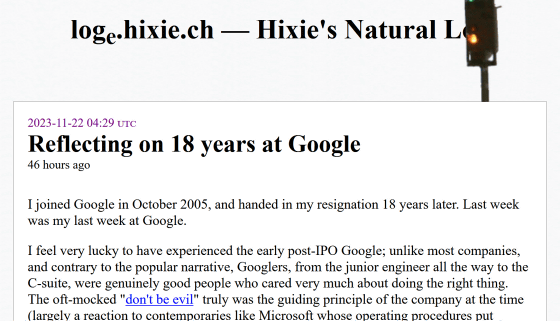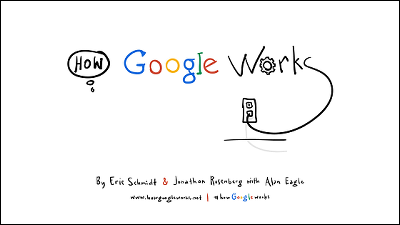What does a person who worked at Google for 18 years from 2005 look back on 'Google in the good old days' and its subsequent transformation?

Hixie's Natural Log: Reflecting on 18 years at Google
https://ln.hixie.ch/?start=1700627373&count=1

When Mr. Hickson joined Google in 2005, it was just after the company's initial public offering, and he said that at the time, Google's employees, from the lowest level employees to the top executives, were pure and good people with a strong interest in doing the right thing. thing. At the time of writing, the slogan 'Don't be evil' was mostly used to make fun of Google's focus on profit, but at the time it was a reaction to Microsoft and other companies fiercely pursuing profits. Don't be evil,'' Hixson said, served as the company's guiding principle.
However, Google's actions that it believes will be beneficial to society often end up exposing it to severe criticism from outsiders . I'm citing Chrome. He also pointed out that privacy advocacy has sometimes criticized Google in ways that are harmful to users, including warnings about the large number of meaningless cookies that pervade the modern web.
'I was deeply frustrated by the way I pursued ideas that would benefit the world without prioritizing short-term Google profits, only to be met with ridicule in the court of public opinion. ” Hixson said.

In its early days, Google was said to have had a very friendly working environment for its employees, with executives giving candid answers to various topics every week, and former CEO
Mr. Hickson spent his first nine years at Google working on developing HTML and related standards. At the time, Mr. Hixson was told clearly that he could ignore Google's interests, and that he did his best to benefit the web as a whole, based on the policy that 'what's good for the web is good for Google.' I'm explaining.
And although he was nominally part of Google's open source team, Mr. Hixon himself was given complete autonomy and carried most of his work to various buildings on Google's campus using his laptop. It is said that he went there. As a result, it seems that the individual desk assigned to him was not used for a long time.
But over time, an exception to Google's traditional culture also emerged. One of them was Vic Gundotra , who was responsible for Google's social network 'Google+'. While Gundotra certainly had enthusiasm and a clear vision, he was unsure about his ability to handle things when things didn't go well, and he began creating silos within the company, such as allocating certain buildings only to the Google+ team. He said. These moves were a departure from the internal transparency that existed at Google in its early days.
In addition, the Android team, which has established a strong position as a mobile OS in modern times, is based on Android, which was acquired by Google in 2005, but it seems that they were unable to fully adapt to Google's culture. . Hickson said, 'The Android team's work-life balance was unhealthy, it wasn't as transparent as the older parts of Google, and the team was more focused on chasing competition than solving real problems for users.' says.

After working on HTML, Hixon spent nine years working on the multi-platform development framework Flutter. Flutter is said to be ``one of the last projects born from old Google,'' and was run like a startup that valued construction over design.
'The Flutter team was built on the culture of early Google, prioritizing internal transparency, work-life balance, and data-driven decision-making,' Hickson said. 'We wanted to be open from the beginning. 'Because of his thoroughness, it was easy to build a healthy open source project,' he says, adding that he has also had great team leaders over the years.
While the Flutter team was relatively isolated from the major changes Google was experiencing during the same period, Google's own culture continued to change. Decision-making changed from being made ``for the benefit of the user'' to ``for the benefit of Google,'' and eventually became ``for the benefit of the person making the decision.'' Also, internal transparency has disappeared, and whereas in the past you could attend company-wide meetings to understand what was going on, management no longer discloses everything to employees. It seems like it's gone. Hixon points out that no one can clearly explain Google's vision, employee morale is low, and clients are dissatisfied with Google.
Hixon points to an increase in layoffs as one sign that Google's culture has changed. While not laying off people during a recession does lead to short-term losses, retaining employees is what brings long-term success, and laying off people in pursuit of immediate quarterly profits is short-sighted, Hixon said. I'm criticizing. Furthermore, when layoffs occur, employees lose trust in the company, avoid taking risks, and become desperate to personalize their knowledge and responsibilities. This is also said to be the cause of worsening Google's situation.

In particular, Hickson accuses CEO Sundar Pichai of lacking foresight and having no interest in preserving Google's early cultural norms. Also, Janinna Banks , who manages departments such as Flutter, Dart , Go , and Firebase , does not have a clear strategy for her team, has a low understanding of the product, and makes incoherent and impossible requests. It was pointed out that there were many
Hickson said of Banks, 'She treats engineers as dehumanizing goods, reassigning them against their will regardless of their skill set. She is unable to receive constructive feedback and She won't even admit it. Other teams, whose leaders are better versed in office politics than me, have learned how to 'maneuver' her by giving her just the right information at the right time. 'I hear you. Having seen Google in its best days, this new reality is depressing.'
Of course, there were many wonderful people at Google at the time of writing the article, and Mr. Hickson admits that he was blessed to have met them. He argues that improving Google requires a shake-up at the top and returning power to someone with a long-term vision for leveraging Google's vast resources to deliver value to users. . However, he expressed concern that if Google continues to lose its moral compass, Google's culture will continue to deteriorate.
Related Posts:
in Note, Posted by log1h_ik







